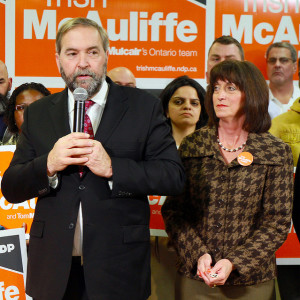NDP: New and Old

The NDP party, while historically significant to Canadian politics, has previously had to deal with the challenge of relating to many middle class and urban citizens, appearing as both rational and organized party, unlike other far left parties, including the green party. This was the NDP’s challenge until Jack Layton came around. In 2003, Layton, a McGill grad, most famously led the NDP to be the official opposition party though means of centralization and advertisement. He was unlike many non-liberal/conservative politicians, energetic and widely respected and accepted by Canadians, thanks to his social work (famously dissuading Canadians from American same-sex marriage legislation as well as being on the Climate Change Protection Program board from 1998-2001), perhaps even reaching legendary status since his untimely death in 2011.
The next leader, Tom Mulcair, proved to be just as resilient, despite having high expectations to live up to. Mulcair, another McGill grad, proved to be yet another powerful figure for the NDP, good and bad (facing a fine for vulgar and defamatory language in 2010). He took large strides for the party, including the “Orange Crush/Orange Wave” in the Quebec Provincial elections, where the NDP claimed 59 of the province’s 75 seats, wiping out the previously dominant separatist Bloc Quebecois. Mulcair again worked on outreach and centralization of the party, making the NDP appealing to voters.
Mulcair was rejected as the leader of the NDP party in Edmonton on April 10th, 2016. Without the legend and post-legend populist as a guiding force, what will the NDP become? Although he remains party leader until the next one is chosen, the New Democrats still have much to fear. Their crushing defeat in the federal elections was blamed on Mulcair, and yet Mulcair added that a ‘strong, united NDP’ was needed ‘ now more than ever’. Doubts of the party members include a fear of the unification process, or the Orange Wave, coming to a halt.
The future of the NDP depends on the next leader to come to power, The candidates are diverse, reflecting the variety within the party itself. First is Niki Ashton, a three term MP who had previously run for the position in 2012. Ashton is a young candidate with an attachment to employment, a topic which concerns many Canadian voters. The spotlight on Ashton may falter if Trudeau’s  youth employment and other workforce plans succeed. If so, she may seem an unnecessary voice for many Canadians, and for the party. Next is Alexandre Boulerice who has shown dedication to the party since the 1990’s and was even co-chair on Mulcair’s election campaign board. However determined he is, Boulerice is still a shaky figure within the NDP, suddenly reversing his support for Mulcair during Sunday’s vote. The NDP needs a strong leader to tie them together during this moment of loss, and an unpredictable leader would not be able to do so. Other important candidates include Nathen Cullen, who although has been a five term MP and has discussed that he wants the party to be a ‘government, not just a voice of conscious,’ does not appear to have the plans to vie for the leadership. Cullen is the most technocratic of the candidates with his opinions on democratic reform and climate change. Whilst appealing to younger voting demographics and innovative ideas in and of themselves, they are likely to push the NDP party out of the mind of many moderate Canadian voters. Lastly is Mike Layton, son of the late Jack Layton. Fairly new to politics, Layton may be riding on the wave of his father, which may not be enough for the faltering NDP anymore.
youth employment and other workforce plans succeed. If so, she may seem an unnecessary voice for many Canadians, and for the party. Next is Alexandre Boulerice who has shown dedication to the party since the 1990’s and was even co-chair on Mulcair’s election campaign board. However determined he is, Boulerice is still a shaky figure within the NDP, suddenly reversing his support for Mulcair during Sunday’s vote. The NDP needs a strong leader to tie them together during this moment of loss, and an unpredictable leader would not be able to do so. Other important candidates include Nathen Cullen, who although has been a five term MP and has discussed that he wants the party to be a ‘government, not just a voice of conscious,’ does not appear to have the plans to vie for the leadership. Cullen is the most technocratic of the candidates with his opinions on democratic reform and climate change. Whilst appealing to younger voting demographics and innovative ideas in and of themselves, they are likely to push the NDP party out of the mind of many moderate Canadian voters. Lastly is Mike Layton, son of the late Jack Layton. Fairly new to politics, Layton may be riding on the wave of his father, which may not be enough for the faltering NDP anymore.
The party’s previous two leaders were arguably individualist. Layton was the first to bring the NDP to the opposition status and was removed from the political stage before his time. Mulcair was the first to defend Layton’s legacy and lead the party further into the realm of mainstream politics, and ultimately failed. Leaders strong in charisma and idealism have brought the party so far, but the NDP is uneasy about its future unity. The party needs an experienced, skillful politician to rebuild its mainstream appeal, and the youth and relative inexperience of Mike Layton restrict him from occupying such a leadership position.
